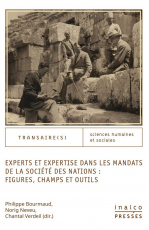

Mandatory Expertise After the League of Nations Mandates: Interconnections and New Directions.
in Philippe Bourmaud, Norig Neveu and Chantal Verdeil, eds., 'EXPERTS ET EXPERTISE DANS LES MANDATS DE LA SOCIÉTÉ DES NATIONS : FIGURES, CHAMPS, OUTILS' (Paris: Presses de l'Inalco, 2020), pp. 333-358.
Pivoting empirically around an economic mission to Syria in 1954 by the International Bank for Reconstruction and Development (IBRD), the forerunner of the World Bank, this essay provides a conclusion to the volume by seeking to identify various ways in which expertise associated with the League of Nations Mandates endured or was recycled in the era after the dissolution of the League, namely the period of the establishment of the United Nations, of the Cold War, and of decolonization. It also suggests ways in which scholarship on expertise might develop the lines of inquiry established in the essays of this volume. To meet these goals, it focuses first on the question of continuity and rupture across 1945, second on the issues of space and scale and the possibility of producing histories of expertise that are both multi-local and trans-national, third on the under-explored topic of expertise associated with capitalist businesses and military institutions, and finally on the opportunities for histories that set late colonial international expertise into the context of the Anthropocene and specifically the « Great Acceleration » of the 1950s.